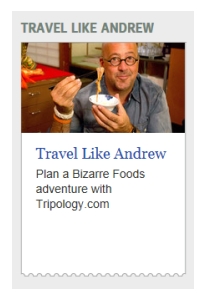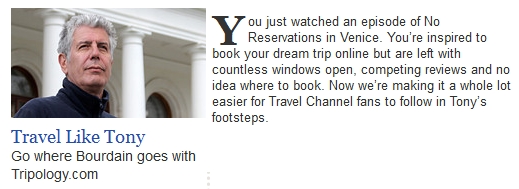Blending “inspiration with activation” in the travel sector
IN-DEPTH: The travel industry has been witnessing initiatives and ventures pertaining to “inspiring” travellers.
These are perfect for research, but many have inherent problems with their business models because most travellers are looking for more than research and suggestions; they want answers to questions, says John T. Peters, SVP/GM Digital Strategy & Business Develpment, Rand McNally. And when their questions are answered, they want action, i.e. booking.
By Ritesh Gupta
Selling and distributing travel is a complex business. Established online travel intermediaries assert that they have the support and technical expertise to turn planning into transactions and are also making investments in increasingly popular consumer channels like mobile and social media.
At the same time, a section of the travel industry believes that what everyone continues to miss about the problems with booking complex travel online is that it isn’t just the technology that is misplaced, it is the human element that is missing, too.
Before looking at this missing human aspect and how travellers are being truly inspired today, one needs to be clear what travel planning is all about.
As pointed byJohn T. Peters, SVP/GM Digital Strategy & Business Develpment, Rand McNally recently, travel planning isn’t booking, but it needs to offer booking after the planning is complete. Travel planning isn’t just pinning travel information to a virtual bulletin board so you can keep all your travel information in one place and share that glut of information with friends - who find it equally irrelevant and confusing. Travel planning is about being able to glean relevant information that applies to a particular travel profile. Travel planning isn’t about getting suggestions from strangers who consider themselves qualified to dole out travel advice based simply on where they live. Travel planning does require advice from someone who is expert at selling and booking travel.
Marrying inspiration with activation
Late last year Rand McNally’s Tripology.com business formed a partnership with Travel Channel,a multi-platform travel lifestyle brand.

Travel Channel is gearing up to offer its viewers unique opportunities to book trips and itineraries inspired by the network’s travel programming. The company forayed into the online travel transaction territorylast year, as it chose to invest in Oyster.com, a hotel reviews site featuring expert hotel reviews. The company has been looking at going beyond the inspiration and entertainment it offers on television. It also decided to connect its audience with trained “tripologists”. According to the company, these personalised online travel agents are equipped with the specific episode details – city, hotels, restaurants, food markets, etc., and will book trips to cities featured on Travel Channel’s television series.

Peters explained how the deal with Travel Channel overcomes limitations normally associated with technology.
Peters said, “Our deal with Travel Channel, which launched late last year, is simple; viewers of shows like Tony Bourdain’s “No Reservations” or “The Layover” and the site pages associated with those shows promote traveling to the places featured in the show programming and in the fashion experienced by the show’s host.”
He added, “Want to travel like Tony? Yes? Click here, submit your trip request to Tripology.”
Then, a specially trained group of Tripologists (who have been trained in Travel Channel content and programming) take over, assisting programme viewers and site visitors with their always-complex travel planning.
“No technology could handle these customers from beginning to end. No amount of regurgitated, (a.k.a. aggregated) content could provide them with the information for which they’re really looking. No amount of “local experts” interested in earning pretty digital badges for their online profile could truly answer their questions and help them book anything. These people, like most other people looking for non-commodity travel, have questions they want answered by a qualified human being whose profession is travel,” said Peters.
Maturity level of personalisation
Assessing the maturity level of personalisation in the travel sector at this juncture, Peters says cookie-cutter travel will continue to thrive in 2012 because of the price-driven market.
“There’s only so much personalisation you can do for a budget trip. That said the entire young affluent market is based on personalisation. Young “affluents” place just as much importance on their travel experiences (like being directed to the most authentic market frequented only by locals in Phuket) as they do on making sure their hotel knows they like to read USA Today.” Personalisation will continue to be an important aspect of travel for the affluent market,” he said.
“I personally think in 2012 we’re going to see a great deal of emphasis on two areas in general; price and experience, but not the two combined. After all, the very nature of our economy dictates travel will be price driven on one side of the economic slide and on the other, the luxury/upscale market will be demanding more inspiration and activation, but will be paying for it. The most important thing to note is there will be an increased demand for value, irrespective of market,” added Peters.
He continued, “For the price conscious, value plays a role because shopping online and finding “cheap” is easy. Suppliers are more adept and offering value-adds to increase the perceived value of a package. On the other side of the economic scale, the younger affluent travellers value their wealth more than their money-burning elders. Those who understand this within the luxury travel market are doing quite well and will continue to do very well with the market. To inspire and activate is to entice someone to travel.”
Competition
The travel industry has been witnessing efforts pertaining to “inspiring” travellers – be it via new search/ discovery engines, flash sale sites, “friend-sourced” travel itineraries etc.
On how such efforts are adding a new dimension to whole travel planning process, Peters said these are perfect for research, but many have inherent problems with their business models because most travellers are looking for more than research and suggestions; they want answers to questions. They want to be involved in the decision making, but really don’t want to get into the weeds of all the minutia. Then, when their questions are answered, they want action, i.e. booking. And they want value. Not “perceived value”, but real value.
Peters commented: “…“Trip Inspiration”; great idea, but help me book. “Flash sales” - a few are fine, but too many have popped up and most over-promise and under-deliver. Further, the deals are normally for components of trips, not entire vacations.”
“For the record, “deal” sites aren’t new. I’m amazed at how we’ve all acted as if “Flash Sale” concepts are new. It is only the marketing of the deals that is new. The problem with flash sale sites is inventory; sure, we’ve got plenty now with our horrible economy. It dries up rather quickly however, when things start showing signs of improvement. So, when the deals evaporate (because eventually, they always do), the business model falls apart,” said Peters.
“As for “friend-inspired” itineraries, this one is a little tough,” he said. He added: “In general, I really like the idea as long as “friend” truly means just that; a real friend, not my Facebook friends. Further, even when it comes to my real friends, I’m cautious. My friends and I often travelled together until we had families and careers. We travel together less frequently now. Our lives are different. Our budgets are different. As such, our travel needs, desires, requirements and travel profiles in general are somewhat different. So, while I’ll value their recommendation for music or a restaurant or even a hotel, I’m not booking an entire vacation based on their recommendation alone. Sure, their recommendations are a good place to start, but that’s about it.”

